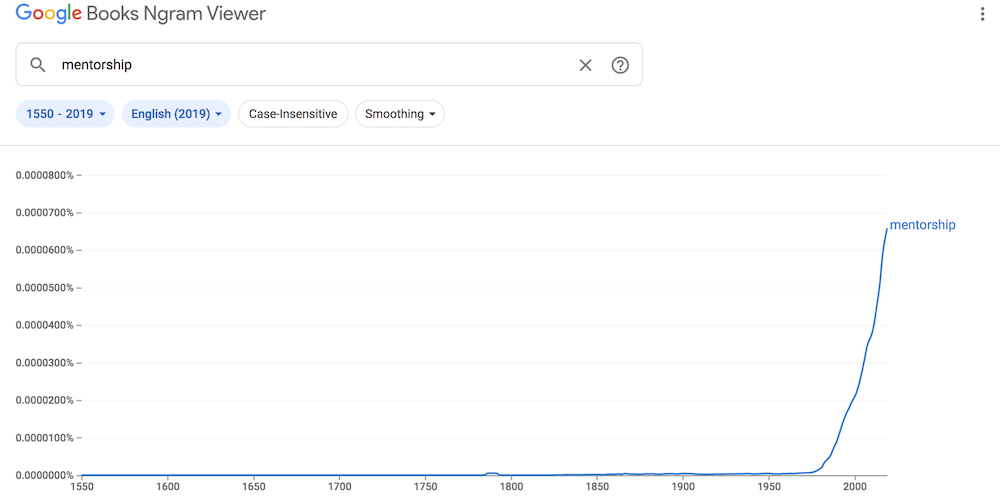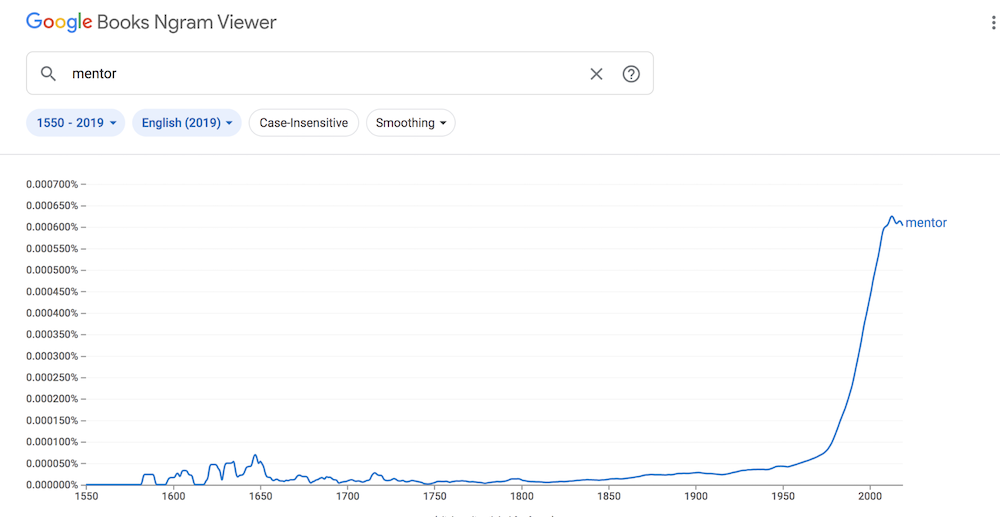In this article, we’ll reconcile these differences by focusing on the fundamental elements that define the terms mentorship, mentors and mentees.
You’ll learn:
- How mentor comes before mentorship
- When mentor and mentorship were first mentioned in printed books
- The meaning and definition of mentorship
- Formal and informal mentorship
- The meaning and definition of mentees
- Mentees’ pursuit of self-improvement
Mentor comes before mentorship
Meaning and definition of mentor
A mentor is an experienced and trusted person who is advising someone less knowledgeable. According to the Oxford English Dictionary, a mentor is “an experienced and trusted adviser.”
But even this definition of mentor has come a long way from its origin. As a term, mentorship comes from mentor.
The concept of a mentor precedes the idea of mentorship. The term 'mentorship' surfaced in the 1780s, while 'mentor' has been in use since the 1580s. This timeline signifies the evolution of the role before the formal recognition of the relationship.
Not convinced? According to Google Ngram Viewer, which analyzes the frequency of various terms from 1500 to the present day, the term mentorship first appeared in in the 1780s:

But the term mentor appeared even earlier… in the 1580s!

As a bit of context, Gutenberg printed the first-ever book using the printing press in 1455.
Mentor Origin and Its Historical Significance
The historical origins of mentor date back to Ancient Greece and come from Homer’s epic, the Odyssey. While the legendary king Odysseus was away to lead his army in the 10-year Trojan War, Mentor, his trusted advisor, was left in charge of the household and to guide Telemachus, the king’s son, toward adulthood.
But Mentor failed to live up to his responsibilities. Several noblemen started lusting over Penelope, Odysseus’s wife, and urged her to marry one of them during his 10-year absence. This meant that Telemachus would have been stripped of his birthright to rule.
Across the years, Mentor failed to provide adequate mentorship and guidance to young Telemachus, who, frankly, grew up to be indecisive and cowardly.
Fortunately, the goddess of wisdom, Athena, came to the rescue, took the form of a wise version of Mentor, and guided Telemachus to his father. After a series of trials and tribulations, they returned to Ithaca, and Telemachus killed all his mother’s suitors. Happy ever after, right?
Mentorship definition, meaning and types
Let’s read Wikipedia’s definition of mentorship:
Mentorship is a relationship in which a more experienced or more knowledgeable person helps to guide a less experienced or less knowledgeable person.
Mentorship includes a “mentor” - an experienced individual - who is meant to guide a “mentee” - a less experienced person. In the Greek epic, Telemachus assumed the role of the mentee, who was under the tutelage of Athena disguised as Mentor.
This gap in knowledge is important to note. This means that a mentorship does not necessarily need to be between a manager and an intern. It may also be between a junior engineer and a student, or a senior art director with ten years of experience mentoring a designer with three years of experience, and so on. It may also be between peers who want to learn from each other’s specializations.
Challenges in mentorship
Mentorship, while immensely beneficial, is not without its challenges. From communication gaps to mismatched expectations, and time constraints, both mentors and mentees can face hurdles that make the relationship less effective. However, understanding these challenges and implementing strategic solutions can significantly enhance the mentorship experience.
Challenge 1: Communication Gaps
Problem: Effective communication is the cornerstone of any successful mentorship. However, differences in communication styles, lack of clarity, or infrequent interactions can lead to misunderstandings and unmet expectations.
Solution: Establishing clear communication protocols at the outset is crucial. This can include agreeing on preferred communication channels (e.g., email, video calls, messaging apps), setting a regular schedule for check-ins, and being clear about expectations. Encouraging open and honest feedback from both parties can also help address issues as they arise.
Challenge 2: Mismatched Expectations
Problem: Mentors and mentees may enter the relationship with different expectations regarding goals, the level of support needed, and the outcomes.
Solution: At the beginning of the mentorship, both parties should discuss and align their expectations. Setting specific, measurable, achievable, relevant, and time-bound (SMART) goals can provide a clear roadmap for the relationship. Regularly revisiting and adjusting these goals as needed can keep the mentorship on track.
Challenge 3: Time Constraints
Problem: Both mentors and mentees often have busy schedules, making it challenging to find time for regular interactions.
Solution: Scheduling regular, dedicated sessions can help ensure consistent engagement. These sessions don't always have to be long; even short, focused meetings can be effective. Additionally, leveraging asynchronous communication methods like email or shared documents allows for flexibility.
Challenge 4: Lack of Structure
Problem: Without a structured approach, mentorship can become aimless, leading to diminished engagement and value.
Solution: Utilizing platforms like MentorCruise can provide a structured framework for the mentorship. These platforms often have tools for setting goals, tracking progress, and scheduling sessions, which add a layer of accountability and organization to the relationship.
Challenge 5: Cultural and Personal Differences
Problem: Differences in cultural backgrounds, personal values, or work styles can create misunderstandings or discomfort in the mentor-mentee relationship.
Solution: Fostering an environment of mutual respect and understanding is key. This involves being open to learning about each other’s backgrounds, actively listening, and being empathetic. Cross-cultural training or workshops can also be beneficial for broadening perspectives.
Informal and formal mentorship
When talking about mentorship in practice, there are many types of mentorships that we have written an article on. But here are two of the most prevalent ones: informal and formal mentorships.
Informal Mentorship
In an informal mentorship, a relationship gets formed between two individuals who are already familiar with each other, and there’s no process to make this official.
For example, a young student might email a more experienced person for advice, and she gets a reply back. Over time, the experienced person becomes invested in the young mentee’s life and starts offering help on relevant issues even when it isn’t expected.
This is a perfect scenario. More often than not, informal mentorship can be quite hard to form, because it involves active engagement from the mentor and the mentee. Without setting commitments, mentorships tend to fail.
Formal Mentorship
Formal mentorships happen when there are commitments that set and define this relationship. In this case, mentors offer their services on a public platform, often for a small payment. This is the first way to keep mentees accountable. Otherwise, mentees can often sign up for mentorship and never actually end up reaching their goals or talking to their mentors.
The mentorship is formed and clear from Day 1. The services are laid out and it’s often possible to switch between multiple mentors (MentorCruise does this with a 7-day risk-free trial!).
This way, it’s possible to get mentorship, grow and succeed quicker, even if it involves more commitment from both sides.
Meaning and definition of mentee
OED defines a mentee as: “A person who is advised, trained, or counselled by a mentor.” Mentees are individuals who are following the expert guidance of mentors through an established mentorship.
Depending on the industry, mentees are also called as disciples, protégés, or even mentoree (yes, the last one’s real).
Mentees are in the pursuit of self-improvement
Whatever term you may prefer to use, a mentee wants to become better in some aspect of their lives, and it’s a title that doesn’t necessarily depend on status or professional seniority.
For example, a founder may need a startup mentor because they need some help in finding solutions to certain growth pains. Or it may be someone who can’t decide on a career path and needs some counselling from someone who’s switched careers.
To be a good mentee means to trust and listen to the mentor’s advice, and to put in the hard work necessary to succeed. On MentorCruise, mentors can set assignments and weekly activities to finish. It’s up to the mentees to stay accountable and finish them within the deadline.
The Ever-Evolving Landscape of Mentorship
As we look toward the future, the landscape of mentorship continues to evolve. With technological advancements and changing societal norms, the way we approach mentor-mentee relationships is bound to transform, making them more accessible and varied.
The rise of remote work and digital communication tools has paved the way for virtual mentorships. These remote connections break down geographical barriers, allowing individuals to seek guidance from mentors across the globe. Virtual mentorship platforms can offer a variety of tools, such as video conferencing, shared digital workspaces, and real-time collaboration tools, enhancing the mentor-mentee interaction despite physical distances.
Additionally, Artificial Intelligence is set to revolutionize how mentors and mentees are paired. AI algorithms can analyze a mentee's goals, professional background, learning style, and preferences to suggest the most compatible mentors. This technology ensures a higher success rate for mentorship pairings by aligning objectives, experiences, and personalities more accurately than traditional methods.
By understanding and embracing the diverse aspects of mentorship, we can unlock its full potential for personal and professional growth.
Mentorship is a two-way street
There are several benefits when it comes to becoming either a mentor or a mentee and pursuing a meaningful mentorship, in which both parties are committed to each other.
Mentors will be able to shape and influence the ideas of those that might succeed them in one way or another. Mentees will get expert guidance and be able to expand their professional circle.
If you’re either a mentor who wants to offer their help or a mentee who needs expert guidance on specific issues, join a thriving mentorship community at MentorCruise, with members who are keen to see others succeed. Just have a look at testimonials made by our mentees on how their lives have positively impacted by mentorship.


